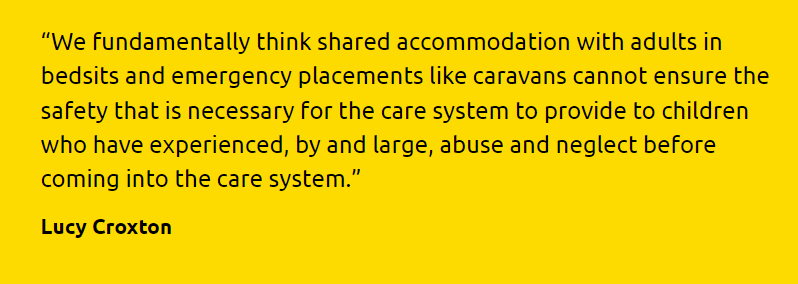 This week, Prime Minister Rishi Sunak declared 4th July as the date for the next general election. Parliament is set to be dissolved on the 30th of May, and the vote will occur 25 working days later. In light of this announcement, we want to highlight the key commitments we expect to see from the next government, whichever political party is voted in. What are some of the changes we want to see? Children's social care
All children in care to receive care We have been members of the Keep Caring to 18 steering group since February 2021. In March 2024, our Policy, Public Affairs, and Campaigns Manager, Lucy Croxton, gave evidence to the Education Committee at Parliament as part of a panel on children's social care. Our position is clear, we believe that all children in the care system should receive care where they live until they are at least 18. Following data we gathered with journalist Tom Wall being published in the Observer and bringing national attention to the issue of children in care living in illegal homes, we’d also like to see a joint national strategy from Ofsted, the Department for Education (DfE) and other relevant government departments to end the use of unregistered accommodation for children once and for all. Due to the impact of inflation and the additional costs stemming from delaying reform to the care system, we will need to see more than the original £2.6bn figure requested by the Independent Review of Children’s Social Care. So far, only £200 million has been allocated by our current government. A significant amount of the new funding should go to dedicated early intervention help, so that children can be supported to be cared for in their families wherever safe to do so. Alongside this, we want to see the full incorporation of the United Nations Convention on the Child (UNCRC) as the most comprehensive declaration of children’s rights. This would create a mechanism to ensure that children’s voices and ambitions are at the heart of policymaking and put children in England on equal footing with those in Scotland, Norway and Sweden. We also want to see a commitment from any new government to address drivers of relative child poverty in the UK. Child poverty has been shown to increase the likelihood of children being taken into care (Bennett, 2022). Source: www.togethertrust.org.uk  A new anthology containing the voices of 100 children and adults about their experience in care is now available in bookshops. Free Loaves on Fridays contains stories, letters and poems from care-experienced people aged 13 to 68. Published today (18 April), the book, edited by Rebekah Pierre, care-experienced social worker and professional officer at the British Association of Social Workers (BASW), features both seasoned writers like Lemn Sissay, as well as those who have put pen to paper for the very first time. It aims to counteract headlines written about care-experienced people which “often entrench negative stereotypes and dominate the narrative, leaving care-experienced people with nothing but crumbs”, Pierre explained. She added: “For far too long, care-experienced people have been the subject, but rarely the author of our own words in assessments, files, and reports. “This is something I know all too well. When I penned an Open Letter to the Social Worker Who Wrote My Case Files a couple of years ago, which unexpectedly went viral, it resonated with many care-experienced people who longed to have more ownership over their own stories.”
Pierre described Free Loaves on Fridays as a “tangible way in which to invite other people with lived experience of care to set the score”. “In a radical move in the publishing industry, we had a no rejection policy, meaning anyone – regardless of their age or former writing experience – could submit a piece. The result is a rich tapestry of courageous, original and powerful voices which would ordinarily have gone under the radar,” she said. “The book holds up a mirror to the system, exposing both the wonderful potential that good, well-funded social work can have, as well as the lifelong consequences when children are let down. “Representation is crucial; I didn’t open up about my care-experience until my late twenties, such was the stigma. So it means everything that the next generation of children in care and care leavers will see themselves proudly represented in bookshops, by people who really get it.” Emma Lewell-Buck, MP for South Shields, and a former social worker, said: “So often, care-experienced people are not listened to, their exclusion from policy setting and decision making is ever apparent. Often those who have experienced care are spoken about as though they are all one homogenous group. They aren’t. Their diverse experiences are brought to life in this book. Please do read Free Loaves on Fridays, it’s an emotional journey that will make you cry and laugh. But most of all understand the reality of our care system and why it absolutely must change.” Maris Stratulis, the national director for BASW (England) added: Free Loaves is an incredibly poignant and powerful book and shines a light on the courage, bravery, creativity and individual uniqueness of each care-experienced child, young person and adult contributor. It has been a privilege and honour to read this book. “This is a must-read for every social worker, we must hear and learn from the voices of the care-experienced community, and influence and change practice and systems for the better.” Free Loaves on Fridays is available to order online and in buy in mainstream bookshops with proceeds going to Article 39 and The Together Trust: https://unbound.com/books/free-loaves-on-fridays Source: www.cypnow.co.uk/news/  Free Loaves on Friday, an anthology of poems, letters, and other forms of writing written by more than 100 care-experienced people with contributions from the Together Trust, will be published this Thursday 18 April. The anthology’s 100 contributors include authors with diverse experiences of the care system aged 13-68 years old. The book features well-known writers such as Lemn Sissay, Sally Bayley, and Kirsty Capes, alongside those being published for the very first time. Several young people supported by the Together Trust charity were involved in one section within the book – the A-Z of allyship - and the anthology was edited by one of our Trustees, Rebekah Pierre. Rebekah is a writer, social worker, and campaigner who works to raise the voices of the unheard. “Free Loaves on Fridays is the book I wish I saw on bookshelves when I was in care. And the book I wish my teachers, classmates and the general public read, too,” says Rebekah Pierre. “To know future generations of children and adults from care will see themselves represented in mainstream bookshops means everything.” Department for Education data shows 81,000 children were in care across England in March and 1,371 were in Manchester – above the national average.
Challenging stereotypes of people with care experience, this collection gives voice to just some of these diverse experiences including foster care, adoption, kinship care and semi-independent living. We are incredibly grateful to be receiving half the profits from the book along with fellow charity Article 39. The anthology is available for pre-sale here: https://unbound.com/books/free-loaves-on-fridays Source: www.togethertrust.org.uk/news  This morning (26 March), our Policy, Public Affairs and Campaigns Manager Lucy Croxton gave evidence to the Education Committee at Parliament as a part of a panel on children’s social care. The panel provided evidence on why costs related to children’s social care are rising; how need is not necessarily being addressed at the right stage in the social care journey; and the increasing complexity in needs and a lack of suitable provision for these children. Discussions also centred around profiteering in children’s social care and how a lack of homes is leading to out of area placements. Lucy championed a need for children in the care system or who have experienced care to have a voice in, not only their own homes, but also in a wider context of national policy - where people with lived experience of the care system have a chance to affect government policy around children’s social care. Alongside this, she also discussed the need for collaboration between care providers in the voluntary sector where vast amounts of knowledge can be shared. She also spoke about the barriers of entry to providers opening new residential homes for children and the issues these can cause in terms of providers moving to semi-independent homes where there have been problems in terms of quality of care. She gave evidence gathered from young people we have supported who have previously experienced semi-independent homes and the negative impact that these placements have had. Alongside Lucy, the panel also included John Pearce – President of the Association of Directors of Children’s Services; Roger Gough - Children’s Services Spokesperson, County Councils Network; Stuart Ashley - Director of Children’s Services, Hampshire County Council; Dan Turnbull, Senior Director for Markets, Competitions and Markets Authority; Mr Andrew Isaac – Chair of Children’s Services Development Group and Dr Mark Kerr. To find out more about our campaigning work and where we stand on a number of issues, visit: https://www.togethertrust.org.uk/campaigning
Source: www.togethertrust.org.uk/news/  As we celebrate Care Day this year, it is a time to reflect on the strides made to improve the way that children in care are looked after across the country, and how much of this progress has been led by care experienced people themselves. Care experienced people have been actively campaigning to improve the care system for as long as it has existed. They have played a central role in securing rights for other young people by sharing their experiences and raising levels of public awareness. This April, many of their stories will be told through Free Loaves on Friday, an anthology written by more than 100 care experienced people and edited by Rebekah Pierre. We are honored to have been involved, and chosen to receive half of the proceeds generated from the books sales so that we can continue to care for all children who need us. We have also seen first-hand the power of care experienced people to make a difference through their involvement in conferences, parliamentary events, meetings with MPs, ministers and regulators. In the words of one passionate campaigner, “children in care are often underestimated”.
Equally, children and the professionals that care for them at the Together Trust have given their time generously to help shape our campaigning positions and consultation responses. This Care Day, we have one strong call to action: let's ensure that every child in care is offered not just a place to stay, but a caring and loving environment that truly meets their needs. You can pre-order your copy of Free Loaves on Friday here Read more about our Keep Caring to 18 campaign here Read our second blog in recognition of Care Day: What does care mean to children?. Source: www.togethertrust.org.uk/  In December, the Education Committee launched an inquiry to evaluate England's children's social care system. On 15 January, we responded to the inquiry; sharing our views on different issues, including what is going wrong and the specific experiences of disabled children. Below is a summary of our response. In a nutshell The current provision of children's social care is insufficient to meet demand. Different factors are causing the increase in demand for children's social care including underinvestment, poverty and deprivation, the impact of policies in other areas (welfare, housing), and lack of support for families. Decreased levels of investment in early intervention have contributed to the rising costs of late-stage children's social care intervention for local authorities. The current system leaves families waiting for extended periods to receive necessary care. Only £200 million has been allocated to solving the sufficiency crisis despite the annual cost of maintaining the current children's social care system being £10 billion a year. Read more here. Social care “market” The children's social care sector faces a long-standing challenge of insufficient residential settings. The rise in unregistered homes, schools and alternative provision for children is a serious issue for the sector. Councils are placing more children in unregistered placements due to increasing need, limited provision, and reported instances of ‘cherry-picking’ where providers refuse to care for children with complex needs. The shortage of placements has led to more children being placed far from home, and in inappropriate placements, causing councils to pay increased costs. This results in unplanned moves and out-of-area placements, affecting children's well-being. We do not support moving children away from their community where it is not in their best interests. Semi-independent accommodation is the fastest-growing “market” for children, not because it is in their best interest, but because it is more profitable, and easier to run, and there is a constant demand as there are too few registered children’s homes that provide care available. We believe that all children in care need care. We do not support the creation of a new regulation and inspection regime for semi-independent accommodation. Experiences of disabled children There is a lack of support for disabled children or children with additional needs. Just 1 in 7 parents and carers said that disabled children have the correct level of support from the children’s social care system (DCP, 2023). The transition from children to adult services can be particularly stark for young disabled people who do not have a formal diagnosis. Additionally, life is more expensive for disabled people, but many do not receive the financial support necessary to help them live a happy life. Recommendations for the government Make children's social care a central aim of policy across areas such as housing, education, immigration, health, and social care (amongst others). Provide funding for wholesale reform to children’s social care to provide certainty to the sector. Prioritise funding for early intervention services to cover family support demand. Build more sufficiency across the country and ensure a place-based approach to address local authorities’ funding uncertainty and planning. Invest in more respite care for disabled children. End the use of semi-independent accommodation, mindful of the recommendation made in the Care Review that “all children should receive care where they live by 2025”. What’s next? We are currently undertaking a research project on unregistered settings. We have volunteers working on research projects in children's social care areas where there are research gaps (e.g., the link between poverty and children entering care). The projects will be published within the year. You can keep up with our updates via our website or by signing up to our campaign emails. Source: www.togethertrust.org.uk News from Together Trust: Advocacy for all children in care: our response to new advocacy proposals4/1/2024
 The government is changing the way that children and young people receive advocacy support, by changing the things that services must provide. This December, we responded to the consultation by providing feedback based on our conversations with staff and advocacy providers. You can read our full response here. Currently, local authorities need to provide advocacy to children in care, children in need and care leavers where they have an active complaint and request help from an advocate. Independent advocacy is when a trained professional works with a child to understand their wishes and views, and advocates on their behalf, for example, to secure the support they need in meetings and working with other professionals. This kind of advocacy must follow national standards, which are instructions for organisations that deliver advocacy services to follow. In addition, there is statutory guidance which says what local authorities should do when they are arranging advocacy for children. The government is planning to change the way that advocacy services work and we have provided feedback about how it could be improved. Changes to advocacy standards The DfE is planning to extend national advocacy standards to other groups of children, including those:
Alongside this, there are new standards which are being suggested, such as non-instructed advocacy for non-verbal children, the need for ‘feelings’ to be considered alongside views and wishes, and for interpretation services to be provided so that children can share their views, wishes and feelings in the language they speak and understand. Despite the standards changing, the scope of statutory guidance will remain unchanged. In our response to the government's proposals, we have asked that standards and guidance be made consistent.
If the proposed changes go ahead, many of the children we care for will have the right to access advocacy services, even where there is no active complaint, particularly non-verbal children. Likewise, children with SEND who we support through our specialist services may be able to access an advocate (due to their ‘child in need’ status or interactions with social services), but we still need further details about how this will work. Before sending our feedback to the Department for Education, we spoke with our residential care managers to understand what was going well and what needed to be improved for children accessing advocacy services. We also held discussions with providers of advocacy services and other professionals in the sector to explore the impact of the proposals and develop our response. The proposed standards are a real improvement on the previous advocacy framework. Access to non-instructed advocacy and the ability to access advocacy without an active complaint will assist many children and young people who have previously been denied access to receive support. Many children entitled to independent advocacy do not know that this service exists, let alone that they are entitled to it. It is positive that organisations will need to inform children of their right to advocacy. We prefer the term ‘active offer’ instead of ‘opt-out advocacy’ and have recommended that the government take this terminology forward instead. We believe that this makes it clearer to professionals that there is a responsibility to routinely communicate the offer and that the offer of advocacy is always there should they need it in future. We also welcome the proposal to recruit advocates from diverse backgrounds to better represent the children and young people they work with. However, we believe that advocates should be able to influence policy, which is currently not allowed within the suggested standards. Any guidance needs to reflect the extended scope of the new national standards. Local authorities have a legal duty to accommodate children under 18 who are unable to live with their families. However, children who should be in care are oftentimes being ‘housed’ under homelessness legislation, which does not give them access to their full set of rights as looked after children. Statutory guidance must therefore make it clear that children who are deemed to be homeless are also entitled to advocacy. If the proposed changes go ahead, many of the children we care for will have the right to access advocacy services, even where there is no active complaint, particularly non-verbal children.
The difference in local authority budgets, resources and staffing are factors which will influence the reform's success. Ensuring that every child in care, child in need, and care leaver has someone standing up for their views, wishes and feelings must be a priority for the government going forward. You can keep up with our updates via our website or by signing up to our campaign emails.
Source: www.togethertrust.org.uk/  Location: Cheadle, Cheshire, with some travel across the North West Salary: Starting at £92,493 Closing Date: Sunday 14th January 2024 Recruitment timetable
Closing Date: Sunday 14th January 2024 Preliminary Interviews With GatenbySanderson: w/c 29th January and 5th February 2024 Executive Profiling And Psychometric Assessment: w/c 19th and 26th February 2024 Final Panel Interview: w/c 4th March 2024 The Together Trust are one of the North West’s leading charities. For over 150 years, we have been championing and caring for people with disabilities and complex health needs, providing life-changing support for looked-after children and care-experienced people and delivering transformative education services. Our vision is a society where everyone thrives because they are valued within their communities. The Trust is deeply rooted in its values and aspires to be person-centred in all its plans, practices, and behaviours and supports over 3,000 children, adults, and families each year. The People and Culture Director will play a vital role in shaping the Together Trust of the future by driving the charity’s people strategy, culture, and human resources initiatives. As a key member of the Trust’s senior leadership team, you will collectively be responsible for driving and overseeing the charity's organisational strategic priorities and ambitions for the children, young people, and families we support. As an ambitious and impactful organisation, the Together Trust is seeking an experienced, high-calibre HR professional with the ability to deliver strategic impact whilst fostering a positive and inclusive working environment. Key duties and responsibilities will include:
With an empowering and collegiate leadership approach, you will display the empathy and emotional intelligence required to build and develop a high-performing and motivated team. Critically, you will demonstrate passion and commitment to the Together Trust’s mission and values. The Together Trust aims to be representative of the communities we are working with. Applications are welcome from all regardless of age, disability, marriage or civil partnership, pregnancy or maternity, religion or belief, race, sex, sexual orientation, trans status, or socio-economic background. We are committed to making reasonable adjustments and positively encourage applications from those with lived experience. To view the job description and person specification, please scroll to the bottom of this page, tick to agree to the privacy policy, then click 'Continue to full details'. How to Apply To apply please upload your CV and address the four questions below in no more than 250 words per question (1000 total):
Deadline for applications: Sunday 14th January These dates may be subject to change and applicants will be advised in advance should this happen. If you wish to have an informal discussion about the opportunities, please contact our retained advisors: Jennie Wood, Research Lead, Not-for-Profit Practice [email protected] / 07827044171 Alex Williams, Senior Consultant, Not-for-Profit Practice [email protected] / 07796940274 Full details and application documents here  Location: Cheadle, Cheshire, with some travel across the North West Salary: Starting at £107,497 Closing Date: Sunday 14th Janaury 2024 Recruitment timetable
Closing Date: Sunday 14th Janaury 2024 Preliminary Interviews With GatenbySanderson: w/c 29th January and 5th February 2024 Executive Profiling And Psychometric Assessment: w/c 19th and 26th February 2024 Final Panel Interview: w/c 4th March 2024 The Together Trust are one of the North West’s leading charities. For over 150 years, we have been championing and caring for people with disabilities and complex health needs, providing life-changing support for looked-after children and care-experienced people and delivering transformative education services. Our vision is a society where everyone thrives because they are valued within their communities. The Trust is deeply rooted in its values and aspires to be person-centred in all its plans, practices, and behaviours and supports over 3,000 children, adults, and families each year. The Commercial Director will play a vital role in shaping the Together Trust of the future by overseeing all the charity’s commercial strategies, partnership building, strategic financial planning, and revenue generation initiatives. As a key member of the Trust’s senior leadership team, you will collectively be responsible for driving and overseeing the charity's organisational strategic priorities and ambitions for the children, young people, adults, and families we support. As an ambitious and impactful organisation, the Together Trust is seeking an experienced individual with the ability to develop and implement the charity's commercial strategy and ensure long-term financial sustainability. Key duties and responsibilities will include:
Critically, you will demonstrate a passion and commitment to the Together Trust’s mission and values. The Together Trust aims to be representative of the communities we are working with. Applications are welcome from all regardless of age, disability, marriage or civil partnership, pregnancy or maternity, religion or belief, race, sex, sexual orientation, trans status, or socio-economic background. We are committed to making reasonable adjustments and positively encourage applications from those with lived experience. To view the job description and person specification, please scroll to the bottom of this page, tick to agree to the privacy policy, then click 'Continue to full details'. How to Apply To apply please upload your CV and address the four questions below in no more than 250 words per question (1000 total):
Deadline for applications: Sunday 14th January These dates may be subject to change and applicants will be advised in advance should this happen. If you wish to have an informal discussion about the opportunities, please contact our retained advisors: Jennie Wood, Research Lead, Not for Profit Practice [email protected] / 07827044171 Alex Williams, Senior Consultant, Not for Profit Practice [email protected] / 07796940274 Full details and application documents here  Every fostering household is different, just like every child in need of foster care is different. We're actively welcoming applications from people from all walks of life, ages, and backgrounds to match with a foster child in urgent need of a home. If you’re passionate about providing a stable and nurturing home for young people, you could make a vital difference to a young person in need of a home now - just like these amazing Foster Together families. “We had wanted kids and fostering seemed like a great option for us,” Lee says, who began fostering with his husband during the pandemic. “Everyone has been supportive since we told them. They can see the difference that can be made to young people in the right environment.” “We have experiences that can help young people if they have questions or need advice,” Lee adds. “It’s a great feeling to help someone and set them up for their life ahead.” The number of mainstream fostering applications in the UK experienced a staggering drop of 21% between 2018 and 2022. Long-standing fosterers who foster time after time, like Annette, are therefore even more critical as waiting lists for placements continue to grow. “Eighteen months ago, another young person came into our family and it’s been wonderful to watch them grow in confidence and develop their self-worth,” says Annette, who has fostered 5 children with her husband over the past decade. As well as competitive allowances and fees, the Together Trust provides fosterers with a tailored training programme, access to a round-the-clock duty social worker, and a monthly foster carers’ support group, amongst other benefits. As a charity, we don’t take any profits for shareholders - all money is used to support and improve the lives of the foster children. Annette shares: “The Together Trust give so much to the young people in our care - offering days out and an annual holiday. The whole process of gaining the skills to foster has continued throughout the support that we receive each year.” “I decided to foster with the Together Trust because they are a charity,” adds Ronan, who began fostering in 2018. “There were a few challenges at first - getting used to having someone new in the house, arranging work around their schedule, being aware of what you say. Mostly just getting used to dealing with a teenager again! “But there were so many highlights too. You get to invest time, love and experience in a young person and give them hope for the future - just knowing that you’re helping someone and making them feel safe was enough.” With Foster Together, we’ve worked hard to build a connected fostering family where staff, carers and families can support each other. In fact, our level of training, support and friendly community mean some of our foster carers have been with us for over 20 years. Learn more about fostering here or click here to make an enquiry and kickstart your fostering journey. Source: www.togethertrust.org.uk |
News & JobsNews stories and job vacancies from our member agencies, the fostering sector and the world of child protection and safeguarding as a whole. Browse Categories
All
|
|
The Fairer Fostering Partnership
c/o TACT Fostering Innovation House PO Box 137 Blyth NE24 9FJ |


















 RSS Feed
RSS Feed
